| Srl | Item |
| 1 |
ID:
182806
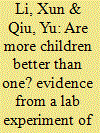

|
|
|
|
|
| Summary/Abstract |
This paper examines the impacts of siblings on people's social preference, risk attitude and time preference with a data set from a large-scale lab experiment. Employing the variation of fine rates under One-Child Policy for excess birth in different regions as instrument to address the endogeneity of whether having siblings, we find that sibling's role mainly focuses on shaping people's social preference that subjects with siblings demand less as responders in ultimatum game and behave more cooperatively in sequential prisoner's dilemma. This conclusion survives through several robustness checks. Our further result suggests that more sibling interactions and less parental expectations are two potential mechanisms through which siblings play a role in making people more prosocial. Our findings point to a positive externality along with Two-Child Policy which is widely neglected in both policy evaluation and relevant theory such as quantity-quality theory, and provide implications for the fertility policy such as the recent Three-Child Policy in China and beyond.
|
|
|
|
|
|
|
|
|
|
|
|
|
|
|
|
| 2 |
ID:
180633
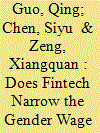

|
|
|
|
|
| Summary/Abstract |
Information and communication technology promotes the rapid development of fintech, which has a far-reaching impact on wage distribution in China. Using data from the Chinese General Social Survey and the Index of Digital Financial Inclusion, this study examines the impact of fintech on the gender wage gap. We find that fintech (i) narrows the gender wage gap; (ii) reduces capital constraints and operating costs, thereby promoting female entrepreneurship, driving more women into employment, and enabling women to increase their wages and bargaining power within the household; and (iii) positively impacts the wages of women (and men) who have lower family economic status, and helps women (but not men) counter the risk of decline in wages caused by childbearing and caring under the two-child policy. These findings have important policy implications and provide evidence of women's improving economic conditions leading to a reduced gender wage gap.
|
|
|
|
|
|
|
|
|
|
|
|
|
|
|
|
| 3 |
ID:
181143
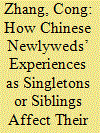

|
|
|
|
|
| Summary/Abstract |
Did growing up as singletons (only-children) convince young adults born under China's one-child policy of the superiority of singleton status and therefore the desirability of not having more than one child? This article draws on interviews with 52 childless newlyweds in Dalian, China, to help answer this question. We found that far from convincing them of the superiority of singleton status, the feelings of loneliness experienced by singletons in childhood and adulthood have convinced most of them that it is better to have a sibling than to be a singleton and thus it is better to have two children instead of one. Moreover, interviewees who did have siblings tended to corroborate singletons’ beliefs about how valuable a sibling can be in both childhood and adulthood.
|
|
|
|
|
|
|
|
|
|
|
|
|
|
|
|
| 4 |
ID:
191156
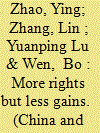

|
|
|
|
|
| Summary/Abstract |
In view of its aging population, China initiated in 2012 a relaxed birth control policy after a three-decades-long implementation of the restrictive one-child policy. This paper examines how China's relaxed birth control policy leads to gender inequality. It specifically focuses on migrant workers because they account for a significant portion of the working group. Using the National Migrant Population Dynamic Monitoring Survey from 2014 to 2016, we found that China's two-child pilot policy reduced female labor force participation by 1.4 percentage points. This negative effect was more pronounced for women with higher educational levels or working in the private sector because employers foresee greater risks of productivity decline. We demonstrated that the gender pay gap increased from RMB956 to RMB1,053 during this same period. Pinpointing these unintended consequences brought about by the relaxation of the one-child policy helps provide a more complete picture of inequality and make sense of persistent relative poverty in Chinese society. To counteract gender discrimination, females are advised to work outside their home jurisdictions and take advantage of positive peer effects.
|
|
|
|
|
|
|
|
|
|
|
|
|
|
|
|
| 5 |
ID:
190412
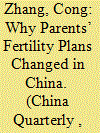

|
|
|
|
|
| Summary/Abstract |
This article examines the fertility desires, intentions and outcomes of 406 alumni of a middle school in Dalian city, Liaoning province, when they were surveyed in 2014–2015 (during their late 20s and early 30s). It also looks at how and why the fertility desires, plans and outcomes of a 47-member representative subsample and their spouses changed from year to year as they moved through their 20s and 30s between 2008 and 2021. Although most respondents started out wanting two children, longitudinal interviews with the representative subsample and their spouses showed that most gradually resigned themselves to having no more than one child. This was because they felt unable to provide two children with the high standard of living and childcare that their own experiences as singletons had led them to consider essential for proper childrearing.
|
|
|
|
|
|
|
|
|
|
|
|
|
|
|
|